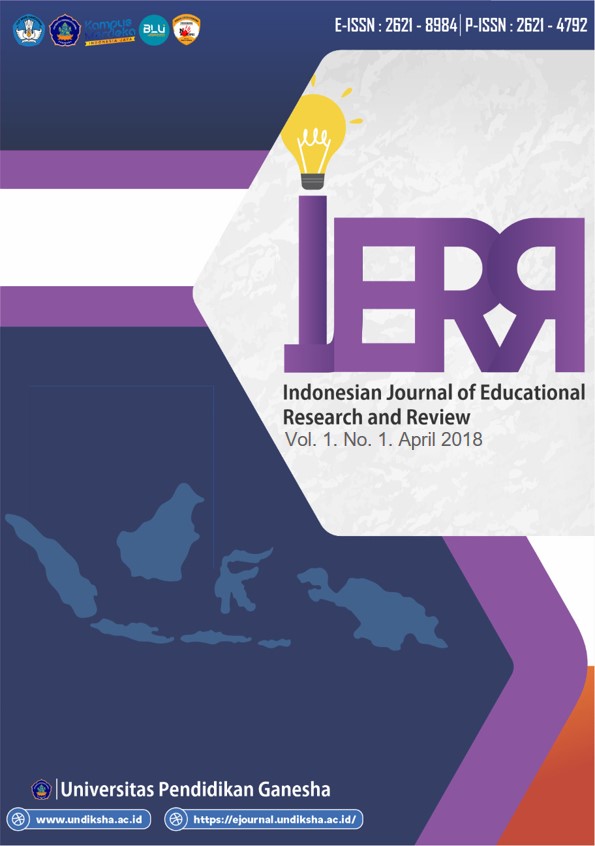KORELASI ANTARA KECERDASAN INTERPERSONAL DENGAN HASIL BELAJAR IPS SISWA KELAS V DI SD GUGUS IV ABIANSEMAL TAHUN PELAJARAN2017/2018
DOI:
https://doi.org/10.23887/ijerr.v1i1.14618Abstract
The research was aimed at determining the significant correlation between the interpersonal intelligence and the social science learning achievement of the fifth-grade students in Elementary School of Gugus IV Abiansemal in the academic year 2017/2018. The type of this research was ex-post facto using asymmetric correlation.The population of this research was the fifth-grade students of Elementary School Gugus IV Abiansemal in the academic year 2017/2018 which consisted of 145 students. The sample was decided by the proportional random sampling technique in which the significance level was 5% and 106 students were obtained from the population. The data collection was conducted through the documentation of students’ learning achievement in social science and the questionnaire about the students’ interpersonal intelligence. The prerequisite test used the normality test of data distribution. After conducting prerequisite test, the hypothesis test using correlation analysis Product Moment was carried out. Based on the analysis result, it was obtained that = 0,484. In the significance level of 5% in which n = 106, it was obtained that = 0,195. As > = 0,484 > 0,195, it can be mentioned that stating that there is no significant correlation between the interpersonal intelligence and the social science learning achievement in the fifth-grade in Elementary School Gugus IV Abiansemal in the academic year 2017/2018 was rejected and was accepted. It can be concluded that there is a significant correlation between the interpersonal intelligence and the social science learning achievement of the fifth-grade students in Elementary School Gugus IV Abiansemal in the academic year 2017/2018. For the result obtained the positive scatterplot of positive correlation, it can be stated that the higher interpersonal intelligence that the students have, the higher social science learning achievement that they will obtainReferences
Agung, A.A.Gede. 2014. Metodologi Penelitian Pendidikan. Singaraja: Universitas Pendidikan Ganesha.
Agung, A.A.Gede. 2016. Statistika Dasar untuk Pendidikan. Yogyakarta: Deepublish.
Amitha, A.F. 2016. Hubungan Kecerdasan Interpersonal Dengan Hasil Belajar Pada Mata Pelajaran IPS Kelas V di SD Intis School Yogyakarta. Prodi Teknologi Pendidikan. Vol.V Nomor 6. UNY. Tersedia pada file:///D:/SKRIPSI%20DEWA/jurnal%20dewa/jurnal%20dewa%202.pdf (diakses pada tanggal 4 Januari 2018 pukul 14.15 wita).
Amstrong, Thomas. 2002. 7 Kinds of Smart. “Menemukan dan Meningkatkan Kecerdasan Anda Berdasarkan Teori Multiple Intelligence”. Jakarta: Gramedia Pustaka Utama.
Arikunto, Suharsimi. 2010. Prosedur Penelitian: Suatu Pendekatan Praktek. Jakarta: Rineka Cipta.
Arikunto, Suharsimi. 2015. Dasar-Dasar Evaluasi Pendidikan. Jakarta: Bumi Aksara
Azwar, S. 2004. Metode Penelitian. Yogyakarta : Pustaka Pelajar.
Baharuddin, H & Esa Nur Wahyuni. 2010. Teori Belajar & Pembelajaran. Cetakan Ke-5. Yogjakarta: Ar-Russ Media.
Dantes. N. 2014. Analisis dan Desain Eksperimen. Singaraja: Program Pasca Sarjana Undiksha.
Dantes. N. 2017. Desain Eksperimen dan Analisis Data. Depok: Rajawali Pers.
Gardner, Howard. 2003. Multiple Intelligence: Kecerdasan Majemuk Teori dalam Praktek. Batam: Interaksara.
Gunawan, Rudy. 2016. Pendidikan IPS: Filosofi, Konsep dan Aplikasi. Bandung: Alfabeta.
Kamus Besar Bahasa Indonesia [online]. https://kbbi.kemdikbud.go.id/entri/cerdas. diunduh pada tanggal 9 Januari 2018 pukul 15.05 WITA.
Kamus Besar Bahsa Indonesia [online]. https://www.google.co.id/amp/s/kbbi.web.id/cerdas.html. Diunduh pada tanggal 20 maret 2018 pukul 17.29 WITA.
Lwin, May. 2005. Cara Membangkitkan Berbagai Komponen Kecerdasan. Jakarta : Gramedia.
Lwin, May. 2008. Cara Mengembangkan Berbagai Komponen Kecerdasan. Jakarta: Indeks.
Pendidikanku.org. 2016. Pengertian Kecerdasan dan Macam-macam Kecerdasan. http://www.pendidikanku.org/2016/09/pengertian-kecerdasan-dan-macam-macam.html . Diunduh pada tanggal 9 Januari 2018 pukul 15.31 WITA.
Prani, Astaga. 2015. Peningkatan Kecerdasan Interpersonal Menggunakan Metode Diskusi Kelompok Dalam Pembelajaran Ips Pada Siswa Kelas IV SD Negeri Kenaran 2 Prambanan. S1 Thesis, PGSD, UNY. Tersedia pada http://eprints.uny.ac.id/14828/2/BAB%20II.pdf (diakses pada 14 Januari 2018 pada pukul 13.35).
Riduwan & Akdon. 2007. Rumus dan Data dalam Analisis Statistika. Bandung: Alfabeta.
Safaria, T. 2005. Interpersonal Intelligence: Metode Pengembangan Kecerdasan Interpersonal Anak. Yogyakarta: Amara Books.
Siregar, Sofian 2015. Stastiska Terapan untuk Perguruan Tinggi Edisi Pertama. Cetakan Pertama. Jakarta: Kencana Prenada Media Group.
Siregar, Sofian 2017. Stastiska Terapan untuk Perguruan Tinggi. Jakarta: Kencana Prenada Media Group.
Sudaryono. 2016. Metode Penelitian Pendidikan. Jakarta: Prenadamedia Group.
Sudjana, Nana. 2004. Dasar-dasar Proses Belajar Mengajar. Bandung: Sinar Baru Algensido Offset.
Sugiyono. 2010. Metodologi Penelitian Pendidikan Pendekatan Kuantitatif, Kualitatif, dan R&D. Bandung : Alfabeta.
Sugiyono. 2014. Metodologi Penelitian Pendidikan. Bandung: Alfabeta Bandung.
Sujarweni, V.W. 2014. Metodologi Penelitian. Yogyakarta: Pustaka Baru Press.
Sukardi. 2014. Metodologi Penelitian Pendidikan. Jakarta : Bumi Aksara.
Sumarni, Sri. 2012. Metodelogi Penelitian Pendidikan. Yogyakarta: Insan Madani.
Syah, Muhibbin. 2003. Psikologi Belajar. Jakarta : Rajawali Pers.
Syah, Muhibbin. 2009. Psikologi Belajar. Jakarta : Rajawali Pers.
Widayat, A. 2017. 14 Agustus. “Negara Maju Karena Kualitas SDM”. Media DJKN, hlmn.1. Tersedia pada https://www.djkn.kemenkeu.go.id/berita_media/baca/12514/Negara-Maju-Karena-Kualitas-SDM.html (diakses pada tanggal 7 Januari 2018 pukul 14.11 wita).
Yaumi, M. 2012. Pembelajaran Berbasis Multiple Intelligences. Jakarta: Dian Rakyat.
Downloads
Published
How to Cite
Issue
Section
License
Authors who publish with the Indonesian Journal of Educational Research and Review (IJERR) agree to the following terms:
- Authors retain copyright and grant the journal the right of first publication with the work simultaneously licensed under a Creative Commons Attribution-ShareAlike 4.0 International License. that allows others to share the work with an acknowledgment of the work's authorship and initial publication in this journal.
- Authors are able to enter into separate, additional contractual arrangements for the non-exclusive distribution of the journal's published version of the work (e.g., post it to an institutional repository or publish it in a book), with an acknowledgment of its initial publication in this journal.
- Authors are permitted and encouraged to post their work online (e.g., in institutional repositories or on their website) prior to and during the submission process, as it can lead to productive exchanges, as well as earlier and greater citation of published work. (See The Effect of Open Access)









